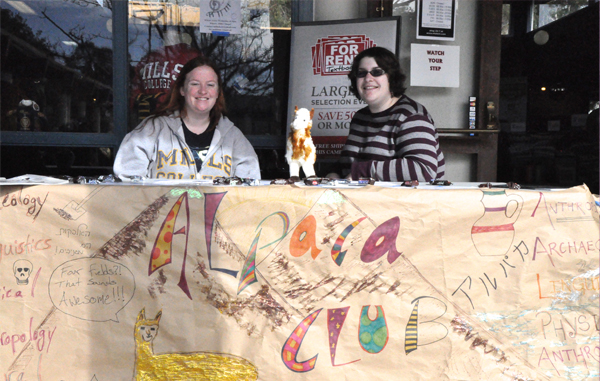
In the two semesters since their creation, the Archaeology, Linguistics, Physical Anthropology, and Cultural Anthropology Club (ALPACA) has gained momentum on the Mills campus, creating a unified space for students interested in anthropology to gather and talk about any aspect of anthropology.
“We wanted a space where we could explore what we’re not getting in class,” said founding president and recent graduate Heather Myers.
Unlike the major, which offers classes focused on one of the four disciplines at a time, ALPACA takes an interdisciplinary approach by looking at how each of the subjects represented in the club’s title work together.
“Anthropology is the study of humans, and it’s meant to be holistic,” Myers said, demonstrating this togetherness by linking her fingers together. “When it’s all broken up, you don’t get all those connections.”
Maura Finkelstein, visiting assistant professor of anthropology and ALPACA’s advisor, echoed this notion.
“The department is limited,” she said. “We can’t do everything. This club gives students the opportunity to get together and talk beyond those limits.”

As a group, ALPACA members work to expand, share and offer support for each other’s ideas in the field of anthropology, and also offer insight into the different angles from which these ideas can be viewed. Each of the eight to ten core members have their own area of study and interest within anthropology, and with such a varied group, this holistic approach can manifest.
“Anthropologists get out and talk,” Finkelstein said. “They form communities and learn from each other.”
Which is exactly what ALPACA does.
“I learn something new every time we meet,” Myers said.
The main practice of the club is the weekly meeting and theme discussion. Every week, current president Erica Veitch, sophomore and anthropology major, or another member sends out a theme-related article to the group, then they gather to talk about it, trying to enter the idea from different angles and discussions.
“There’s an element of pure interaction,” Veitch said of the meetings. “There’s a lot more room for discussion than in the classroom.”
The club also organizes guest lecturers to come speak to the group, and is working on organizing a trip to Angel Island to look closely at the anthropology of immigration. To Veitch, this will be a great way to practice the intersection of all the ALPACA disciplines, all of which, she feels, are present in every field of study.
“No matter what you’re major is,” she said, “anthropology is in there.”
Veitch cited this as a reason why anyone, not just anthropology students, should join ALPACA.
“Don’t be frightened off by the academic-sounding title ‘anthropology,'” she said. “There’s something for everyone in this group, and we actually have a lot of fun.”
Myers reflected this idea. Though they are an academically focused group, she said, they are also a fun group, summing it up by saying:
“We like to mix our academics with our amusement.”
ALPACA meets every Thursday 12pm to 1pm in Vera Long room 102, though the location may change. For more information, email alpaca@mills.edu.

